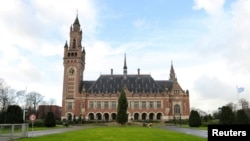The World Court started to hear preliminary arguments on Monday in a case brought against Myanmar demanding that it halt alleged acts of genocide against its Rohingya Muslim minority, with representatives of the junta representing Myanmar.
Presiding Judge Joan Donoghue only briefly addressed the debate over who has the right to represent the Southeast Asian country at the U.N. court after the military took power a year ago.
The junta has not been recognized by the U.N. General Assembly.
Monday is the first of four days of hearing discussing the junta's objections to the jurisdiction of the court, formally known as the International Court of Justice (ICJ). A decision could take months to reach.
The junta nevertheless wants to be Myanmar's formal representative. The parallel civilian National Unity Government, made up of members of the ousted administration and other junta opponents, accepts the court's jurisdiction but also wants to be Myanmar's representative.
The case was brought in 2019 by Gambia, a predominantly Muslim African country, backed by the 57-nation Organisation for Islamic Cooperation.
Gambia claims that Myanmar has violated the Genocide Convention, citing events in 2017 when more than 730,000 Rohingya Muslims fled Myanmar into neighboring Bangladesh after a military-led crackdown. A U.N. fact-finding mission concluded that the military campaign had included "genocidal acts."
The Myanmar military denies the accusation, saying it was conducting a legitimate campaign against insurgents who attacked police posts.
Judge Donoghue recalled that the parties in cases before the court "are states, not particular governments" before going on to call on Myanmar's new representative, Ko Ko Hlaing.
Ko Ko Hlaing is minister for international cooperation for the junta. He briefly introduced Myanmar's case and assured the court the military government wants to cooperate with the judges.
"In arguing that the court lacks jurisdiction or that the case is inadmissible, Myanmar is therefore not thereby seeking to impede the judicial process of the court. On the contrary it's seeking to answer the proper administration of justice. Myanmar raises these preliminary objections with utmost respect to the court," he said, before handing off to Myanmar's lawyers for the legal arguments underpinning the case.
They argue the Gambia is a proxy for others and has no legal standing to bring a case because the alleged facts were not on their territory or aimed at Gambian nationals.
At a press conference arranged outside the court, the foreign minister of the National Unity Government called on judges not to recognize junta representatives.
"The court should discontinue the current hearing and proceed to the merits," Zin Mar Aung said by video link.
The ICJ had determined the hearing could proceed under its rules, on the basis of communications with junta-approved diplomats.
Myanmar civilian leader Aung San Suu Kyi attended preliminary hearings in the case in 2019 in the Hague when she also denied genocide had taken place. She has been in detention in Myanmar since the coup.
In a 2020 decision, the court ordered Myanmar to take measures to protect the Rohingya from harm, given the urgency of the matter.
Speaking to reporters outside the court, Ambia Perveen of the European Rohingya Council said that while the junta does not represent the people of Myanmar it was important the case moved ahead.
"The people who perpetrated genocide should be brought to justice," she said.
Should the court rule that it has jurisdiction to hear the case, a decision on the merits of Gambia's allegation could take years more to reach.




